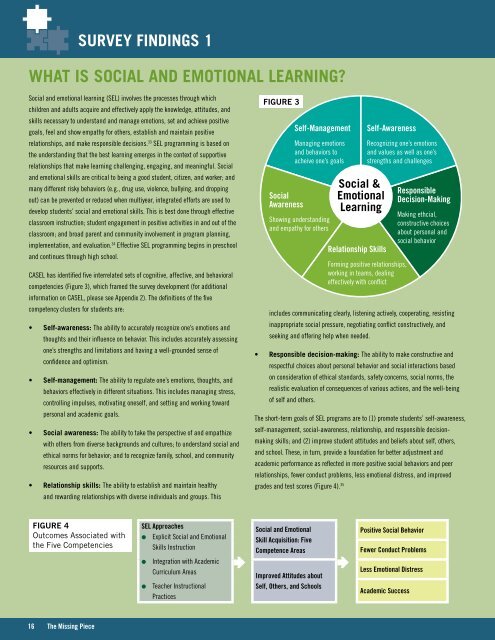CASEL-Report-low-res-FINAL
CASEL-Report-low-res-FINAL
CASEL-Report-low-res-FINAL
You also want an ePaper? Increase the reach of your titles
YUMPU automatically turns print PDFs into web optimized ePapers that Google loves.
16 the Missing Piece<br />
Survey FindingS 1<br />
WHAT iS SoCiAL ANd EMoTioNAL LEARNiNg?<br />
Social and emotional learning (SEL) involves the processes through which<br />
children and adults acquire and effectively apply the knowledge, attitudes, and<br />
skills necessary to understand and manage emotions, set and achieve positive<br />
goals, feel and show empathy for others, establish and maintain positive<br />
relationships, and make <strong>res</strong>ponsible decisions. 33 SEL programming is based on<br />
the understanding that the best learning emerges in the context of supportive<br />
relationships that make learning challenging, engaging, and meaningful. Social<br />
and emotional skills are critical to being a good student, citizen, and worker; and<br />
many different risky behaviors (e.g., drug use, violence, bullying, and dropping<br />
out) can be prevented or reduced when multiyear, integrated efforts are used to<br />
develop students’ social and emotional skills. This is best done through effective<br />
classroom instruction; student engagement in positive activities in and out of the<br />
classroom; and broad parent and community involvement in program planning,<br />
implementation, and evaluation. 34 Effective SEL programming begins in p<strong>res</strong>chool<br />
and continues through high school.<br />
<strong>CASEL</strong> has identified five interrelated sets of cognitive, affective, and behavioral<br />
competencies (Figure 3), which framed the survey development (for additional<br />
information on <strong>CASEL</strong>, please see Appendix 2). The definitions of the five<br />
competency clusters for students are:<br />
• Self-awareness: The ability to accurately recognize one’s emotions and<br />
thoughts and their influence on behavior. This includes accurately assessing<br />
one’s strengths and limitations and having a well-grounded sense of<br />
confidence and optimism.<br />
• Self-management: The ability to regulate one’s emotions, thoughts, and<br />
behaviors effectively in different situations. This includes managing st<strong>res</strong>s,<br />
controlling impulses, motivating oneself, and setting and working toward<br />
personal and academic goals.<br />
• Social awareness: The ability to take the perspective of and empathize<br />
with others from diverse backgrounds and cultu<strong>res</strong>; to understand social and<br />
ethical norms for behavior; and to recognize family, school, and community<br />
<strong>res</strong>ources and supports.<br />
• Relationship skills: The ability to establish and maintain healthy<br />
and rewarding relationships with diverse individuals and groups. This<br />
Figure 4<br />
Outcomes Associated with<br />
the Five Competencies<br />
SEL Approaches<br />
● Explicit Social and Emotional<br />
Skills Instruction<br />
● Integration with Academic<br />
Curriculum Areas<br />
● Teacher Instructional<br />
Practices<br />
4<br />
Figure 3<br />
Social<br />
Awareness<br />
Self-Management<br />
Managing emotions<br />
and behaviors to<br />
acheive one’s goals<br />
Showing understanding<br />
and empathy for others<br />
Social &<br />
Emotional<br />
Learning<br />
Relationship Skills<br />
Self-Awareness<br />
Recognizing one’s emotions<br />
and values as well as one’s<br />
strengths and challenges<br />
Forming positive relationships,<br />
working in teams, dealing<br />
effectively with conflict<br />
Responsible<br />
Decision-Making<br />
Making ethcial,<br />
constructive choices<br />
about personal and<br />
social behavior<br />
includes communicating clearly, listening actively, cooperating, <strong>res</strong>isting<br />
inappropriate social p<strong>res</strong>sure, negotiating conflict constructively, and<br />
seeking and offering help when needed.<br />
• Responsible decision-making: The ability to make constructive and<br />
<strong>res</strong>pectful choices about personal behavior and social interactions based<br />
on consideration of ethical standards, safety concerns, social norms, the<br />
realistic evaluation of consequences of various actions, and the well-being<br />
of self and others.<br />
The short-term goals of SEL programs are to (1) promote students’ self-awareness,<br />
self-management, social-awareness, relationship, and <strong>res</strong>ponsible decisionmaking<br />
skills; and (2) improve student attitudes and beliefs about self, others,<br />
and school. These, in turn, provide a foundation for better adjustment and<br />
academic performance as reflected in more positive social behaviors and peer<br />
relationships, fewer conduct problems, less emotional dist<strong>res</strong>s, and improved<br />
grades and test sco<strong>res</strong> (Figure 4). 35<br />
Social and Emotional<br />
Skill Acquisition: five<br />
Competence Areas<br />
Improved Attitudes about<br />
Self, others, and Schools<br />
4<br />
Positive Social Behavior<br />
fewer Conduct Problems<br />
Less Emotional Dist<strong>res</strong>s<br />
Academic Success


